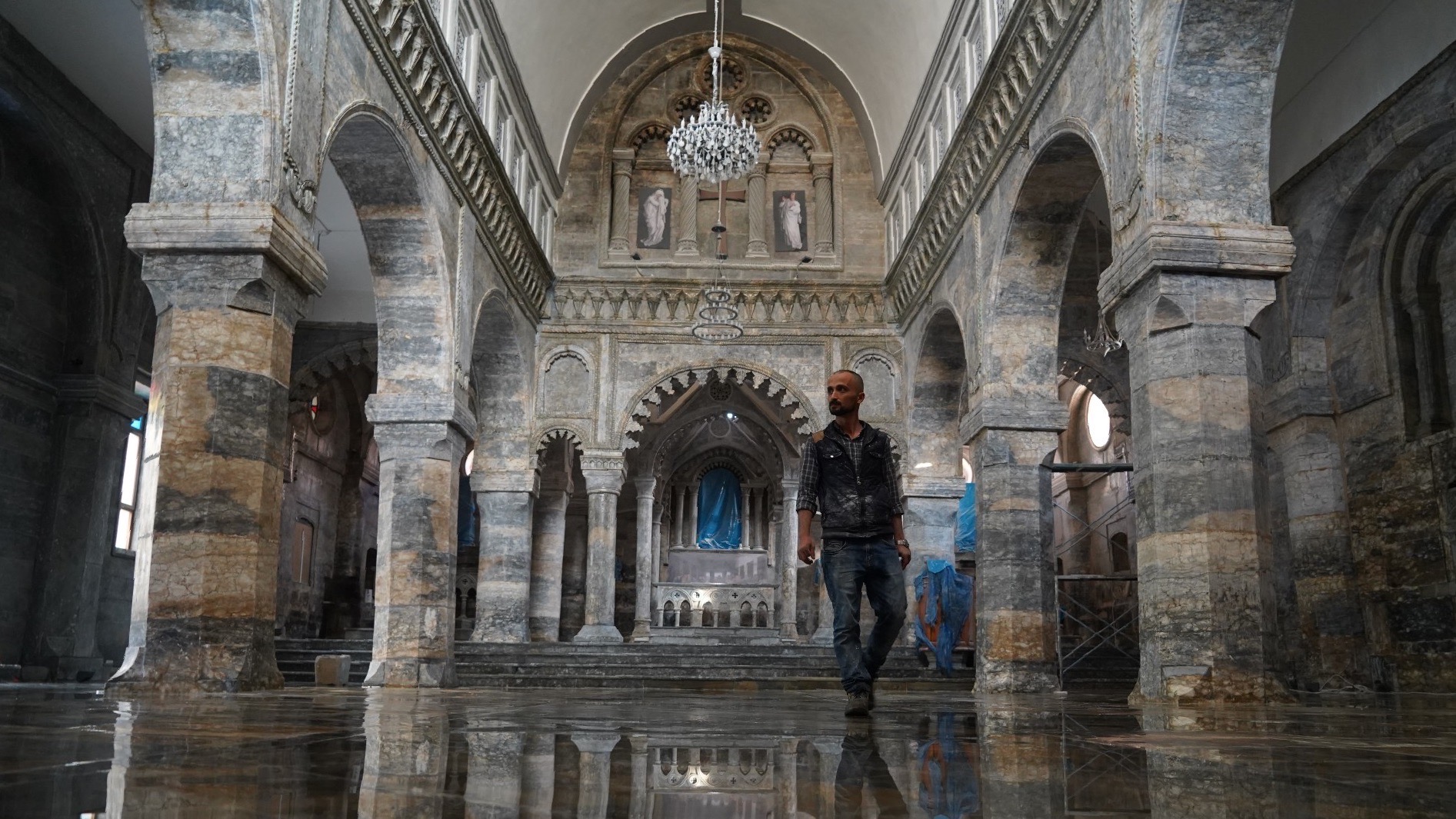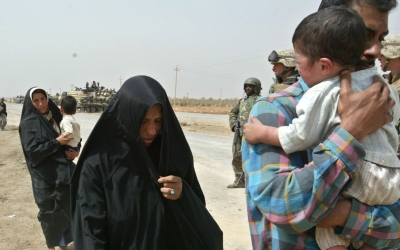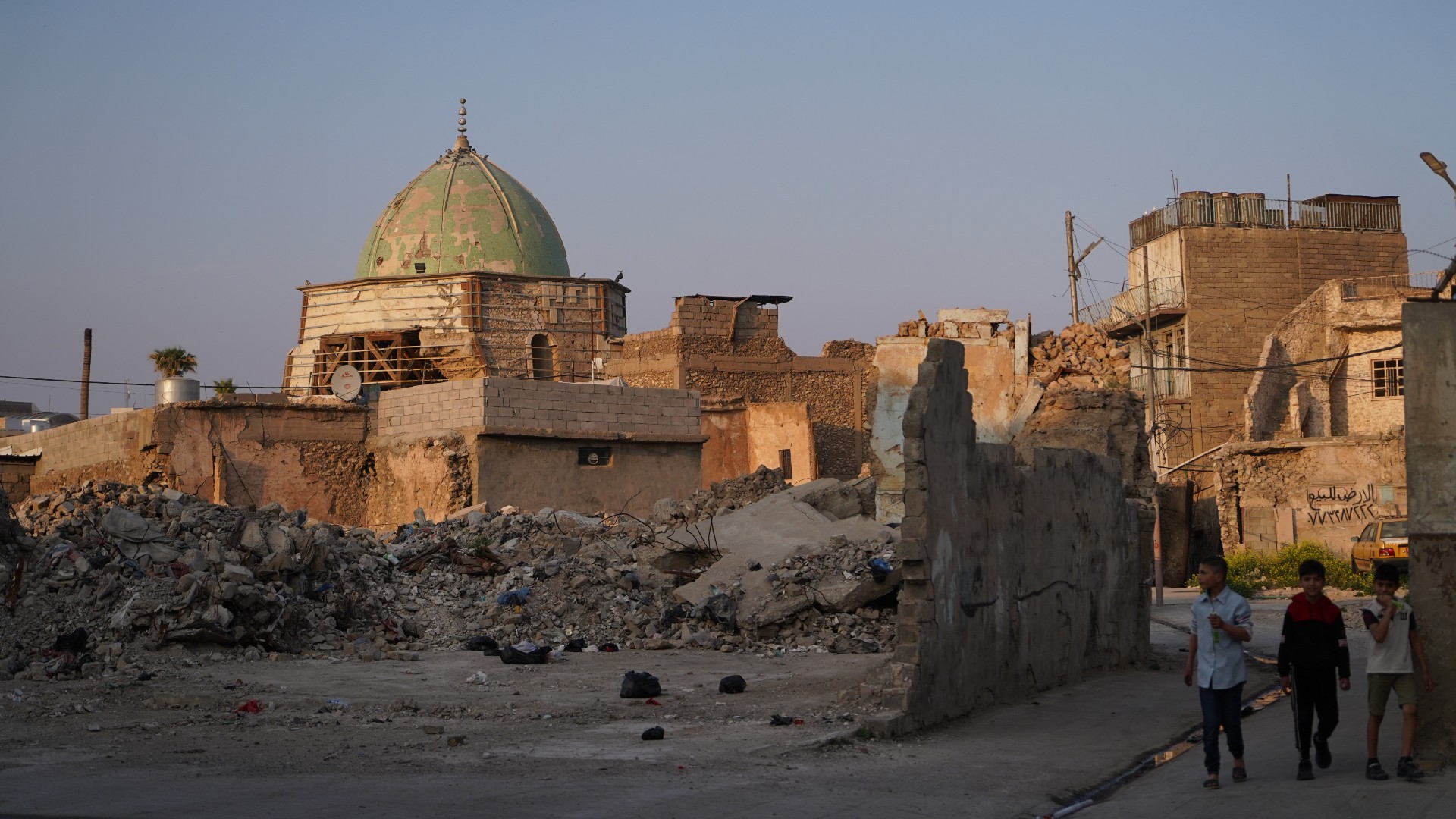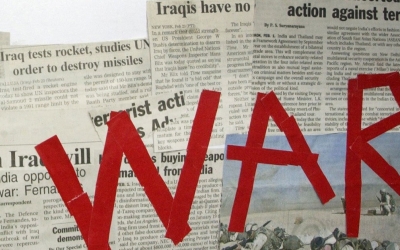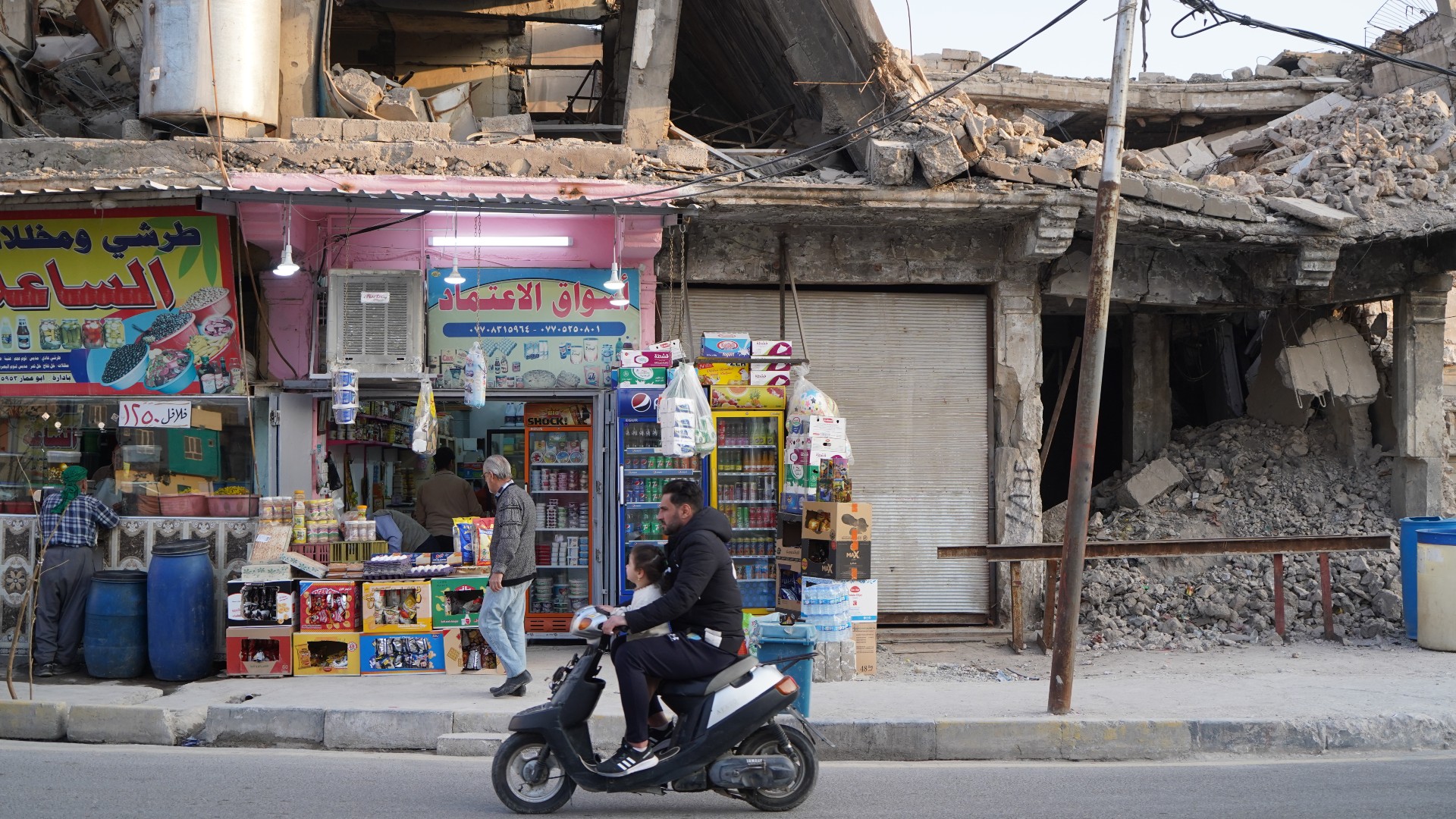Iraq war: Twenty years after 'shock and awe', Mosul residents still picking up the pieces
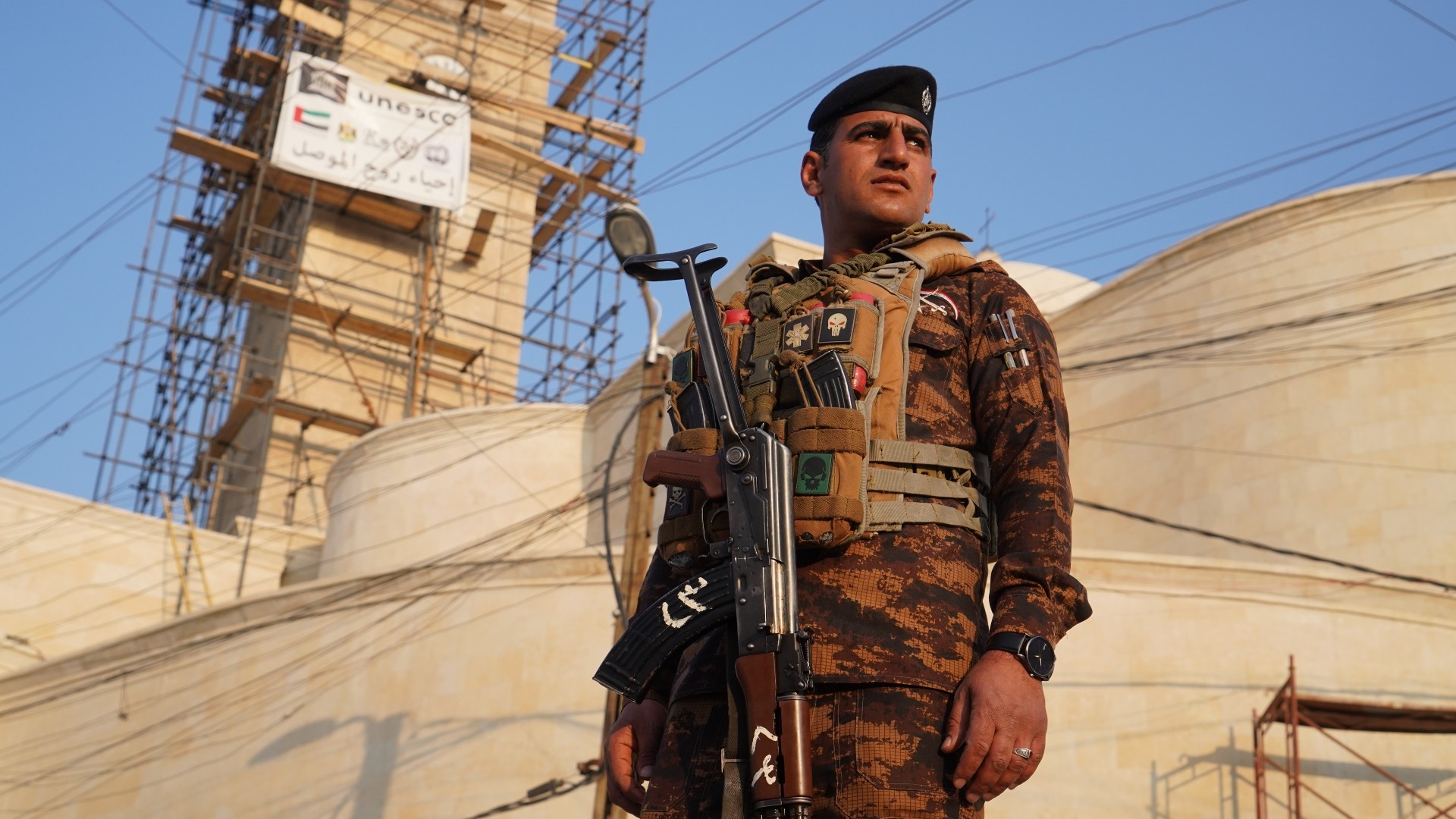
It all started with the "shock and awe" bombing campaign that the US had promised.
Hundreds of US missiles rained down on the Iraqi capital Baghdad exactly 20 years ago today, when Washington and its allies launched their invasion aimed at toppling Iraq's then-strongman, Saddam Hussein.
A series of concussive blasts lit up the night sky on 20 March 2003, laying waste to large sections of the capital, as anti-aircraft tracers flashed yellow and white, leaving luminescent trails to help Iraqi gunners target coalition fighter jets.
As ordinary Iraqis clamoured for safety, Iraq's Baathists knew that the writing was on the wall, but a long and brutal insurgency lay ahead.
Saddam would soon go on the run, and the devastating insurgency, that his loyalists wanted, would later arise.
New MEE newsletter: Jerusalem Dispatch
Sign up to get the latest insights and analysis on Israel-Palestine, alongside Turkey Unpacked and other MEE newsletters
'That security vacuum brought about calamities that we continue to endure'
- Raho al-Abbas, Mosul resident
The violence, which is now estimated to have directly killed up to 306,000 Iraqi civilians, was based on faulty claims that Saddam had secretly stashed weapons of mass destruction (WMD).
Such weapons were never found.
Later that year, US forces would capture the dishevelled former dictator on the outskirts of his hometown in Tikrit, without firing a single shot.
In Mosul, a city that has been plagued by violence ever since, the effort to remove Saddam isn't remembered for the faulty intelligence or the capture of the dictator, but for the destruction and misery that the invasion unleashed.
"The looting began almost immediately," Raho al-Abbas, a 52-year-old butcher, told Middle East Eye on the twentieth anniversary of the start of the invasion.
With security forces and officials fleeing the city, outsiders came to Mosul and began robbing banks and looting homes, he added.
"That security vacuum brought about calamities that we continue to endure. The invasion was the cause of all this."
Minorities targeted
For almost every Iraqi, the past 20 years have been full of unimaginable twists and turns.
While the US-led invasion resulted in the overthrow of Saddam's government, the conflict opened a power vacuum that left the oil-rich nation ripe for a power struggle between Iraq's own rival sects and parties, neighbouring Iran, Gulf states, and militant groups.
In the summer of 2014, fighters belonging to the Islamic State group (IS) swept over Mosul when they seized large swathes of the country.
Over the next few years, the group killed thousands of Iraqi civilians from a variety of religions, but they also persecuted the Christian community, razing churches, shrines and monasteries.
"After the invasion, we spent a lot of time at home and did not leave because of the deteriorating situation," Hamid Touzi, a 31-year-old Christian, told MEE.
Iraq was estimated to have nearly 1.5 million Christians before the 2003 invasion, many of whom had lived here for centuries, with the city boasting Chaldean, Syriac, Assyrian, and Armenian churches.
But church officials estimate only a few hundred thousand, or even less, remain today. The rest are scattered across the globe, having resettled in Europe, the US, as well as neighbouring countries.
Many who have stayed say they feel abandoned, with some wary of neighbours with whom they once shared feasts and religious celebrations.
"There was a church close to where we lived called Umm al-Ma'ounah, but we stopped attending mass there because of the frightening events and threats from IS," Touzi said. "Even the priest stopped coming."
"Christians were frequently targeted, many people were threatened and emigrated. Many people were killed."
Nostalgia for Saddam
With Shia militias holding considerable power more than two decades on, divisions in Iraqi society have given rise to nostalgia for Saddam among some war-weary victims.
When IS swept into Mosul in 2014, some of Saddam's supporters were among those who welcomed the armed group as protectors against Baghdad's Shia authorities. A group of ex-Saddam era military officers even pledged support for the so-called caliphate.
While most of Mosul's residents turned against the armed group during their two years of harsh rule, few here said they trusted the central authorities that had now returned.
"Many people here miss the Saddam regime," a young Iraqi man told MEE on condition of anonymity, fearing reprisal from Shia militias.
"People used to live well and the simplest of life's necessities were readily available such as water, electricity, oil and gas.
"Currently, even the most basic services are difficult to come by."
While it's been nearly six years since the guns fell silent in the onetime Islamic State capital, much of the hope that residents of Mosul have to rebuild their lives has diminished, even as the threat of the caliphate has faded.
Several buildings and public hospitals lie in ruin, and in the Old City, large areas are still heaps of rubble.
During the war, people lived in constant fear, thinking they may lose their homes, their family members, or their lives at any time, Touzi said.
Due to the threat of violence against Christians and other minorities, his family eventually fled and now reside in Iraqi Kurdistan.
Woeful preparedness
In the war-damaged Old City - only steps from the iconic al-Nuri Mosque where former IS leader Abu Bakr al-Baghdadi made his only confirmed public appearance - some businesses reopened their doors.
Still, Ali Aghwan, a professor of political science in Mosul, blamed Washington's woeful preparedness for the state of anxiety in the city, adding that the Bush administration lacked a "basic understanding of Iraqi society, its formations, sects, clans, and other divisions".
It's worth noting, he said, that these failures were why more US soldiers lost their lives in guerrilla-style attacks than during the war itself.
"There were a number of American decisions that led to the collapse of the security situation... and this led some people to embrace armed action. This was later exploited by regional and even international actors," Aghwan told MEE.
"We had armed groups belonging to regional and international organisations such as al-Qaeda and other sectarian armed groups and they sowed chaos in Iraq. This was one of the reasons for the failure of the civil administration that was leading Iraq at that period."
According to an account of a meeting in 2002, almost a year before the war was launched, former US President George W Bush told UK Prime Minister Tony Blair that he didn't know who would replace Saddam when they toppled him and he "did not much care" about the issue.
'Things were previously better'
He said that a clear example of this was the poor way in which detention facilities built to house prisoners of war were built.
Baghdadi was once held at the Abu Ghraib and Camp Bucca detention centres, the latter of which was later referred to as a "Jihadi University" because of the training provided there.
"At Camp Bucca, the extremists forced moderate detainees to listen to clerics who advocated jihad," Andrew Thompson, a veteran of the US war in Iraq, wrote in the New York Times in 2014.
"The majority of prisoners were illiterate, so they were particularly susceptible. The prisons became virtual terrorist universities. The hardened radicals were the professors, the other detainees were the students, and the prison authorities played the role of absent custodian."
Adel Jasim Mohammed, a former inmate, said he witnessed prisoners "giving courses using classroom boards on how to use explosives, weapons and how to become suicide bombers".
The Americans in charge, he said, "did not stop them".
With the chaos fuelling the trade in people-smuggling to Europe, the British Home Office has said that Iraqis comprise the fourth largest national group crossing the English Channel in small boats.
"Before the invasion, a good life was possible, seeking employment was possible, even security existed," Abbas, the butcher, said.
"Compared to the current situation, our lives have worsened. Things were previously better."
This article is available in French on Middle East Eye French edition.
Middle East Eye delivers independent and unrivalled coverage and analysis of the Middle East, North Africa and beyond. To learn more about republishing this content and the associated fees, please fill out this form. More about MEE can be found here.


